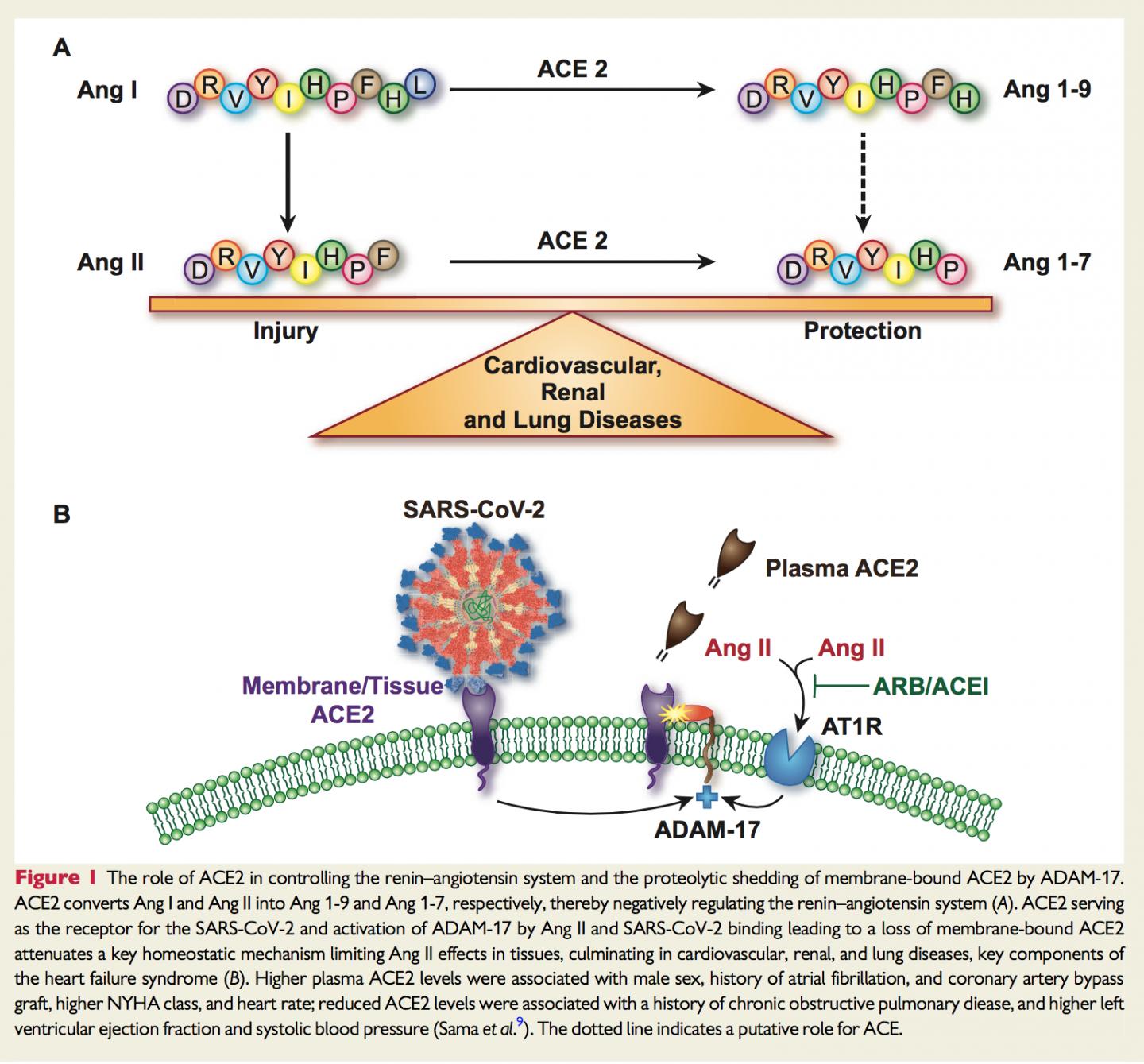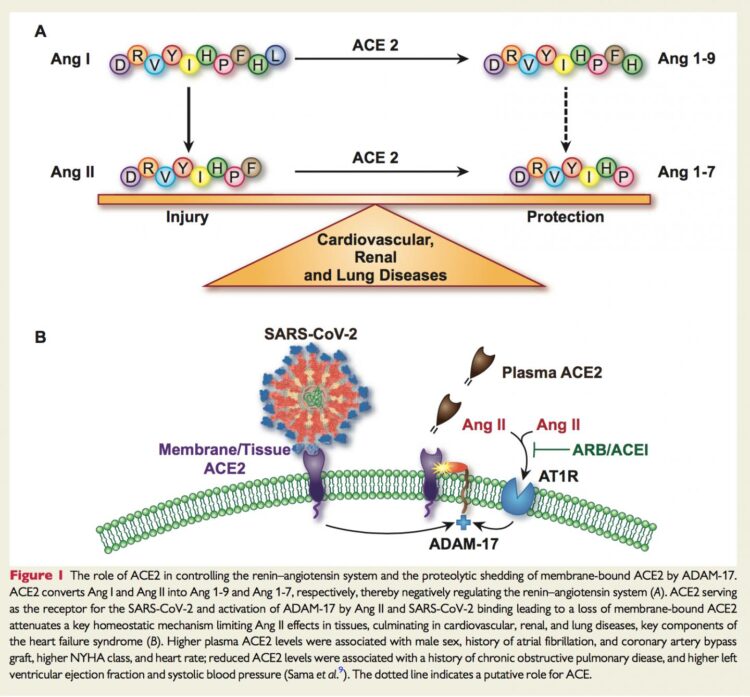Finding may explain why men with heart failure suffer more from the coronavirus than women

Credit: European Heart Journal
Evidence from a large study of several thousand patients shows that men have higher concentrations of angiotensin-converting enzyme 2 (ACE2) in their blood than women. Since ACE2 enables the coronavirus to infect healthy cells, this may help to explain why men are more vulnerable to COVID-19 than women.
The study, published in the European Heart Journal [1] today (Monday), also found that heart failure patients taking drugs targeting the renin-angiotensin-aldosterone system (RAAS), such as angiotensin-converting enzyme (ACE) inhibitors or angiotensin receptor blockers (ARBs), did not have higher concentrations of ACE2 in their blood.
Dr Adriaan Voors (MD-PhD), Professor of Cardiology at the University Medical Center Groningen (The Netherlands), who led the study, said: “Our findings do not support the discontinuation of these drugs in COVID-19 patients as has been suggested by earlier reports.”
Some recent research suggested that RAAS inhibitors might increase concentrations of ACE2 in plasma – the liquid part of blood – thereby increasing the risk of COVID-19 for cardiovascular patients taking these drugs. The current study indicates that this is not the case, although it looked only at ACE2 concentrations in plasma, not in tissues such as lung tissue. In addition, the study cannot provide definitive evidence on the effects of RAAS inhibitors in patients with COVID-19. Its conclusions are mainly restricted to heart failure patients, and the patients did not have COVID-19, so the researchers cannot provide a direct link between the course of the disease and ACE2 plasma concentrations.
Prof Voors said: “ACE2 is a receptor on the surface of cells. It binds to the coronavirus and allows it to enter and infect healthy cells after it is has been modified by another protein on the surface of the cell, called TMPRSS2. High levels of ACE2 are present in the lungs and, therefore, it is thought to play a crucial role in the progression of lung disorders related to COVID-19.”
Prof Voors and his colleagues were already studying differences in markers of disease in the blood between men and women before the coronavirus outbreak. The results became available soon after the pandemic began.
The first author of the study, Dr Iziah Sama from UMC Groningen, said: “When we found that one of the strongest biomarkers, ACE2, was much higher in men than in women, I realised that this had the potential to explain why men were more likely to die from COVID-19 than women.”
The researchers measured ACE2 concentrations in blood samples taken from two groups of heart failure patients from 11 European countries [2]. There were 1485 men and 537 women in the first group, the index cohort, which was designed to test the researchers’ hypotheses and research questions. Then the researchers validated their findings in a second group of 1123 men and 575 women, the validation cohort.
The median (average) age of the participants in the index cohort was 69 years for men and 75 years for women, and in the validation cohort it was 74 and 76 years, respectively.
When the researchers looked at a number of clinical factors that could play a role in ACE2 concentrations, including the use of ACE inhibitors, ARBs and mineralocorticoid receptor antagonists (MRAs), as well as a history of chronic obstructive pulmonary disease, coronary artery by-pass graft and atrial fibrillation, they found that male sex was the strongest predictor of elevated ACE2 concentrations. In the index cohort, ACE inhibitors, ARBS and MRAs were not associated with greater ACE2 plasma concentrations, and in the validation cohort, ACE inhibitors and ARBs were associated with lower ACE2 concentrations, while MRAs were only weakly associated with higher concentrations.
“To the best of our knowledge, this is the first substantial study to examine the association between plasma ACE2 concentrations and the use of blockers of the renin-angiotensin-aldosterone system in patients with cardiovascular disease. We found no evidence that ACE inhibitors and ARBs were linked to increased ACE2 concentrations in plasma. In fact, they predicted lower concentrations of ACE2 in the validation cohort, although we did not see this in the index cohort,” said Prof Voors.
“The effect of MRAs on ACE2 concentrations is not clear, as the weak increase in concentrations in the validation cohort was not seen in the index cohort. Our findings do not suggest that MRAs should be discontinued in heart failure patients who develop COVID-19. They are a very effective treatment for heart failure and the hypothetical effects on viral infection should be weighed carefully against their proven benefits,” he said.
ACE2 is found not only in the lungs, but also the heart, kidneys and the tissues lining blood vessels, and there are particularly high levels in the testes. The researchers speculate that its regulation in the testes might partially explain higher ACE2 concentrations in men, and why men are more vulnerable to COVID-19.
Other limitations of the study include the fact that the researchers only measured concentrations of ACE2 in plasma, not in tissues, so they cannot be sure that concentrations in the blood are similar to those seen in tissues; it is the ACE2 in the lung tissues that are thought to be important for viral infection of the lungs, not ACE2 concentrations in the blood.
In an accompanying editorial [3], Professor Gavin Oudit, from the University of Alberta, Canada, and Professor Marc Pfeffer, from Brigham and Women’s Hospital, Harvard Medical School, USA, write: “When faced with the rapidly expanding COVID-19 pandemic and in the absence of definitive data, the results of Sama et al obtained in heart failure patients in the pre-COVID-19 period offer supporting evidence to continue ACE inhibitors or ARBs in patients at risk for SARS-CoV-2 infection. However, this field is moving so rapidly that we now have two observational studies of ARB/ACE inhibitor use in hospitalized COVID-19 patients showing no augmented risk to COVID-19 patients and even suggesting possible benefit.”
The study is one of several research papers, clinical reviews, editorials and discussion papers on COVID-19 and cardiovascular disease to be published in a special issue of the European Heart Journal on Thursday 14 May. [4]
###
Notes:
[1] “Circulating plasma concentrations of angiotensin-converting enzyme 2 in men and women with heart failure and effects of renin-angiotensin-aldosterone inhibitors”, by Iziah E. Sama et al. European Heart Journal. doi:10.1093/eurheartj/ehaa373
[2] The 11 European countries are: The Netherlands, UK, Germany, France, Greece, Slovenia, Serbia, Italy, Norway, Poland, Sweden.
[3] Plasma angiotensin-converting enzyme 2: novel biomarker in heart failure with implications for COVID-19″, by Gavin Y. Oudit and Marc A. Pfeffer. European Heart Journal. doi:10.1093/eurheartj/ehaa414
[4] “”Focus issue on COVID-19 and CVD,” European Heart Journal, Issue 19. https:/
Media Contact
Emma Mason
[email protected]
Related Journal Article
http://dx.





